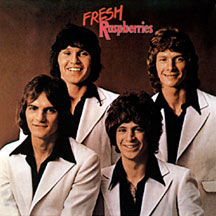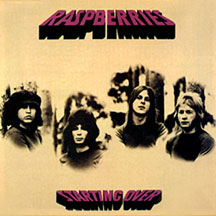Raspberries was an American pop rock band formed in 1970 from Cleveland, Ohio. They had a run of success in the early 1970s music scene with their pop rock sound, which AllMusic later described as featuring "exquisitely crafted melodies and achingly gorgeous harmonies." The members were known for their clean-cut public image, with short-hair and matching suits, which brought them teenybopper attention as well as scorn from some mainstream media outlets as "uncool". The group drew influence from the British Invasion era—especially The Beatles, The Who, The Hollies, and Small Faces—and its mod sensibility. In both the US and the UK, the Raspberries helped pioneer the power pop music style that took off after the group disbanded. They also have had a following among professional musicians such as Jack Bruce, Ringo Starr, and Courtney Love.

"More Than a Feeling" is a song by the American rock band Boston, released as the lead single from the band's 1976 debut album by Epic Records in September 1976, with "Smokin'" as the B-side. Tom Scholz wrote the whole song. The single entered the US Billboard Hot 100 on September 18 and peaked at number five. The track is now a staple of classic rock radio, and in 2008, it was named the 39th-best hard rock song of all time by VH1. It was included in the Rock and Roll Hall of Fame list of the "500 Songs That Shaped Rock and Roll" and is ranked number 212 on Rolling Stone's "500 Greatest Songs of All Time", updated from its previous position of number 500 on the 2004 version.

Eric Howard Carmen is an American singer, songwriter, guitarist, and keyboardist. He was first known as the lead vocalist of the Raspberries. He had numerous hit songs in the 1970s and 1980s, first as a member of the Raspberries, and then with his solo career, including hits such as "All by Myself", "Never Gonna Fall in Love Again", "She Did It", "Hungry Eyes", and "Make Me Lose Control".

"All by Myself" is a song by American singer-songwriter Eric Carmen, released by Arista in December 1975 as the first single from Carmen's debut album, Eric Carmen (1975). The verse is based on the second movement of Sergei Rachmaninoff's c. 1900–1901 Piano Concerto No. 2 in C minor, Opus 18. The chorus was taken from the song "Let's Pretend", which Carmen wrote and recorded with the Raspberries in 1972. The slide guitar solo was performed by studio guitarist Hugh McCracken.

"I Want You to Want Me" is a song by the American rock band Cheap Trick. It is originally from their second album In Color, released in September 1977. It was the first single released from that album, but it did not chart in the United States in its original studio version, which was influenced by music hall styles.

Fresh is the second studio album by Raspberries, released in 1972. It contained two Top 40 singles. "I Wanna Be With You" reached number 16 on the Billboard Hot 100, number 10 on Cash Box and number 7 on Record World. "Let's Pretend" reached number 35 on Billboard, number 18 on Cashbox, and number 14 on Record World. It was their highest-charting album, peaking at number 36 on the Billboard album chart.

Side 3 is the third album from the Raspberries, released in 1973. The album cover is diecut like a basket of Raspberries, with the group's name placed at the top of the LP sleeve. Three singles were released from the album: "Tonight" / "Hard to Get Over a Heartbreak", which reached number 69 on the US Billboard Hot 100 and number 37 on the Cash Box chart; "I'm a Rocker", which reached number 94 on Billboard and number 75 on Cash Box; and "Ecstasy", which did not chart on Billboard but reached number 116 on Cash Box. The album itself reached number 138 on the US albums chart.

Starting Over is the fourth and final studio album by the 1970s power pop band Raspberries. It peaked at #143 on the Billboard pop album chart in 1974. Rolling Stone named it its rock record album of the year for 1974. The LP generated the #18 Billboard pop single "Overnight Sensation ", while a second single, "Cruisin' Music", did not chart. This was the first album by the Raspberries to feature songs with profanity. Those songs were "Starting Over", which featured the word "fucking" once, and the song "Party’s Over", which featured the word "shit" twice.

"All Day and All of the Night" is a song by the English rock band the Kinks from 1964. Released as a single, it reached No. 2 in the UK on the Record Retailer chart and No. 7 on the US Billboard Hot 100 chart in 1965. The song was included on the Kinksize Hits EP in the UK and the Kinks' second American album, Kinks-Size (1965).

"Hungry Eyes" is a song performed by American musician Eric Carmen, a former member of the band Raspberries, and was featured in the film Dirty Dancing (1987). The song was recorded at Beachwood Studios in Beachwood, Ohio in 1987. "Hungry Eyes" peaked at No. 4 on the Billboard Hot 100 chart and No. 3 on the Cash Box Top 100 in 1988. The power ballad was not released commercially in the UK, but it managed to peak at No. 82 in January 1988, having charted purely on import sales.
Wallace Carter Bryson is an American guitarist, best remembered for his time with the power-pop group Raspberries, famous for their hits Go All The Way. After Raspberries split in 1974, Bryson co-formed the power pop group Fotomaker and became one of the leading members of the group.

"Till the End of the Day" is a song by the Kinks, written by Ray Davies and released as a single in 1965 and later on their album The Kink Kontroversy. It centres on a power chord, like many of the group's early hits, and was similarly successful, reaching number eight in the United Kingdom and number 50 in the United States, spending eight weeks or more in each chart.

"Go All the Way" is a single by American rock group Raspberries, released in July 1972 and written by frontman Eric Carmen. The song reached the Top 5 on three principal US charts: number 5 on the Billboard Hot 100, number 4 on Cashbox and number 3 on Record World. The single sold more than 1.3 million copies, earning the band their only certified Gold Record. It was their second single release, their all-time biggest US hit, and appeared on their debut LP, Raspberries.

Raspberries' Best Featuring Eric Carmen, more commonly known as Raspberries' Best, is a 1976 compilation album by Raspberries. The album contained songs from each of the group's four LP's, which were recorded between 1972 and 1974. Most of the tracks on this LP were among their seven charting hits. The group had already disbanded when this compilation was released.

"Voices" is a song written by Rick Nielsen and recorded by American rock band Cheap Trick which appeared on the album Dream Police. The single was released in 1979 and peaked at number 32 in the US. The single has become one of the band's more widely known tracks.

"Let's Pretend" is a song by Raspberries, released in March 1973 as the second single from their second LP, Fresh. It was written by band leader Eric Carmen, who also provided the lead vocals.

"I Wanna Be with You" is a hit single by Raspberries, released in November 1972. It was written by band leader Eric Carmen, who also provided the lead vocals. It was their first single release from their second LP, Fresh. It became their second greatest US hit.

"Overnight Sensation (Hit Record)" is a hit single by Raspberries, released in September 1974, on the Capitol label. It was written by band leader Eric Carmen, who also provided the lead vocals. It was the first single release from their fourth and final LP, Starting Over.

"Tonight" is a song by Raspberries, released in August 1973. It was written by band leader Eric Carmen, who also provided the lead vocals. The song was the first of three single releases from their third LP, Side 3.

"Ecstasy" is a song written by Eric Carmen that was first released by the Raspberries on their 1973 album Side 3. It was also released as a single but did not chart.


















